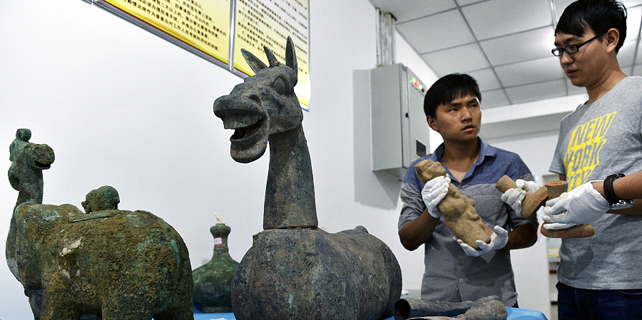Retail expert sees opportunities for foreign firms

If Jack Chuang had not been so inquisitive about how things worked when he was younger, he may have ended up going into medicine. But engineering and science intrigued him more.
"As a kid I was more interested in how things worked, and creating things, than in what made us tick," said the 37-year-old partner and head of the Greater China region for OC&C Strategy Consultants.
These days, however, he draws a lot on human behavior, especially when working with retail and consumer clients.
Founded in 1987, OC&C Strategy Consultants is not a household name, but in the retail and consumer sectors it is well known as a problem solver.
"I guess you can say we help them clarify difficult issues, especially when it comes to strategic challenges," Chuang said of his clients.
Many of the challenges faced by clients involve technology and digitalization. He said technology is now integrated into every facet of Chinese shopping behavior — from research, pricing and transactions to consumer feedback.
For ordinary Chinese, online shopping has become a fact of daily life.
"They understand it and know how it works — young and old. True, some older people have issues with it, but on the whole it has been pretty well accepted."
China's online retail sales totaled 5.16 trillion yuan ($749 billion) last year, up 26.2 percent from the previous year. And it is estimated that online shopping will exceed $1 trillion by 2019.
One company that Chuang works with is online giant Alibaba.
"This is a company which has transformed the Chinese shopping landscape through its marketplace, creating promotional occasions such as Nov 11 Singles Day, and arguably the most important move of setting up a trusted payment platform, Alipay," he said.
In the first five minutes of Singles Day last year, $1 billion was spent in Alibaba's online marketplaces. Alibaba reported a new sales record of $17.8 billion that day for retailers on its platforms, up 32 percent on 2015.
Originally referred to as Double Eleven, it began as an informal holiday in 1990. Alibaba saw it as an opportunity for an annual shopping spree.
China's online sales on Nov 11 totaled a record-breaking $25.8 billion in 2017, up 44 percent year-on-year, according to Beijing-based e-commerce data provider Syntun.
"Domestic demand is huge in China," Chuang said. "More and more people are going online to shop. Consumers appear to be more adaptable to new technology than consumers in the West."
He said the Chinese had not grown up with the mall culture popular in many Western countries. "Like in many sectors in China, consumers have leapfrogged the mall and (gone) straight into online shopping.
"It was fairly easy in a way, because there were no incumbents (well-established brick-and-mortar retailers) holding back the development of online shopping."
Chuang said one of the problems in many countries is that the full potential of online shopping has been held back by incumbents not wanting to change. In China, consumers just go online.
Previous OC&C research has shown that a major factor in online sales growth among Chinese millennials is their desire to express their individuality. This has driven the young generation to seek new brands and products online which are not yet widely available in China.
"Selling online in China is rewarding yet not easy," Chuang said.
"Brands can benefit and achieve their online objective through partnering with strategically aligned platforms and by customizing their offerings to cater to various needs of different market segments.
"In addition, brands need to figure out the level of control and capability which an online store demands, so as to determine whether to establish in-house operations or to rely solely on platforms," he said.
"Choosing the right model and strategy can definitely make it much more effective."
Price and convenience-related factors are consistently placed as the top reasons for buying online in China.
The growing middle class wants to save money on everyday consumables, so as to spend those savings on a better lifestyle, including for dining out or buying international fashion brands.
"Consumers' need for convenience is fueling the demand to buy online anywhere, anytime. All these are favorably fulfilled in China given the rapid development in infrastructure and logistics across the country, in both intra-country movement of goods as well as last-mile delivery to consumers," Chuang said.
Alibaba and JD.com together command about 70 percent of the online market in China. While Amazon has a presence, it is dwarfed by these two competitors.
"Alibaba is a kind of Amazon plus eBay plus PayPal all wrapped together … a one-stop shop," Chuang said.
Alipay has already been rolled out in China and is spreading around the world.
Chuang was born in Taipei. His father, a pharmacist, and mother, a nurse, migrated to the US when Chuang was 9 so that he and his brother could get a "better education".
He studied electrical and computer engineering at Cornell University, an Ivy League university in New York state, and did internships at the National Institute of Standards and Technology and some of the biggest US technology companies such as Lockheed Martin, Cisco Systems and Intel.
Chuang moved back to Taipei in 2004 with Intel and later to Beijing, also with Intel, the following year.
Working in the technology sector, his future looked set — but life took him in another direction, to consulting and more specifically retail.
"I decided that by getting into consulting it would give me the greatest breadth of experiences and depth in specific areas of interest for me," he said.









